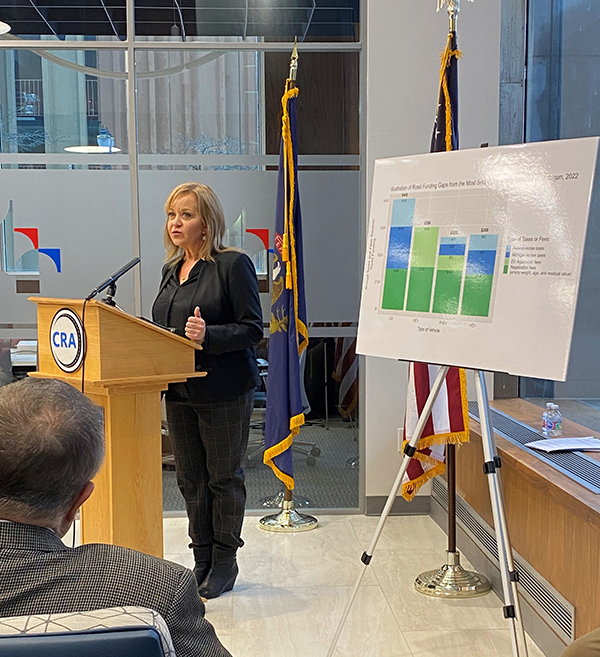Legislative Update 1-20-23
‘Essential’ for Michigan to address funding impact of EVs, MAC says

MAC’s Deena Bosworth speaks at a Tuesday press conference regarding a new report on the funding challenges presented by electric vehicles.
It is “essential” that Michigan quickly identify a new revenue source for public roads in response to the fiscal effects of the growing ranks of electric vehicles (EVs), MAC’s director of governmental affairs told a Lansing press conference on Tuesday.
In her remarks at the event to unveil a study on EVs and road funding, Deena Bosworth also noted, “As the report demonstrates, in 2021 1.9 percent of vehicles on roads in Michigan were electric. While this number may seem small, it is not insignificant. That number will undoubtedly grow, and we will continue to lose gas tax revenue at an alarming rate. We must consider other revenue sources, or we will be left in a hopeless and helpless position.”
The event was hosted by the County Road Association of Michigan (CRA) to unveil the study, which was conducted by the Anderson Economic Group.
As outlined in Public Act 51, roads in Michigan are primarily funded by the tax on motor fuel and vehicle registration fees. EV drivers are clearly not contributing to the gas tax and are paying a reduced registration fee. As more drivers transition to EVs each year, Michigan will see a dramatic decrease in revenue, and we will no longer be able to maintain and repair our roads.
The report came from an EV workgroup coordinated by CRA that includes MAC, other local government groups, business leaders and transportation experts.
Between 2019 and 2021, the report says, EVs on the road cost the state $50 million. By 2030, $65 million to $90 million will be lost annually. The report proposes several potential policy solutions, including an annual flat registration surcharge, mileage-based user fees, per kilowatt-hour fees and tolling. It will ultimately be up to the Legislature and governor to determine which path forward will best serve the people of Michigan. The workgroup plans to work closely with them during the decision-making process.
MAC is dedicated to finding realistic solutions that both promote EV adoption and sustain road systems.
You can find the full report here: The Impact of Electric vehicle Adoption on Road Funding in Michigan.
For more information on MAC’s infrastructure work, contact Madeline Fata at fata@micounties.org
MAC committee assignments finalized; look for email confirmations
 After consultation with MAC staff, Board President Stan Ponstein has finalized policy committee assignments for 2023. Confirmation letters will be going out by email today (Jan. 20).
After consultation with MAC staff, Board President Stan Ponstein has finalized policy committee assignments for 2023. Confirmation letters will be going out by email today (Jan. 20).
MAC received a record number of applicants this year – and all applicants were assigned at least one committee. However, if you applied to multiple committees, you may not have been selected to serve on all of them.
Also included in the email is a document outlining committee rules and procedures. It is important that members make note of the attendance requirements and committee schedule. If for any reason you no longer wish to, or are unable to, serve on any of the committees you have been assigned to, please alert your MAC committee liaison.
The meetings of MAC’s six policy committees are essential in developing MAC’s policy platforms each year. We are grateful to each new and returning member that applied. Regular meetings will begin in February, so mark your calendars!
For more information on MAC’s policy-making process, contact Deena Bosworth at bosworth@micounties.org.


 Staff picks
Staff picks





